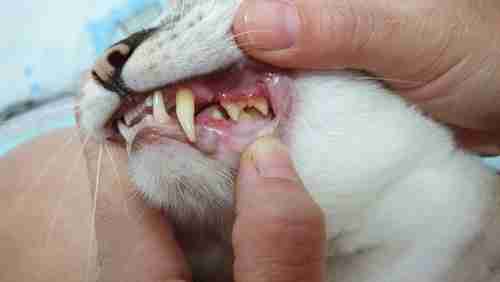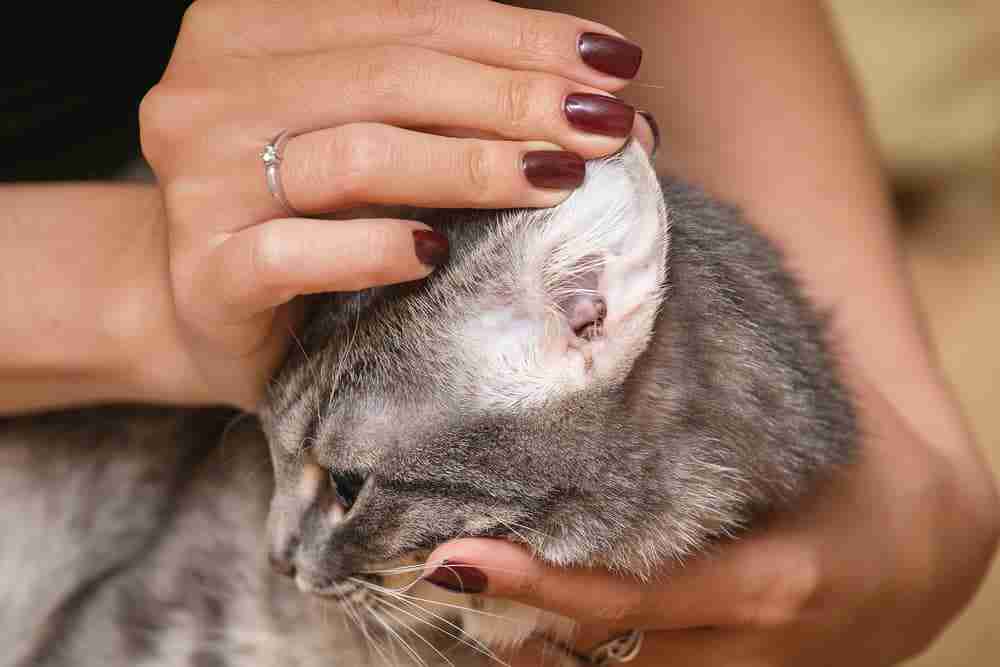Coconut oil is enjoying a burst of popularity thanks to its recognition as a superfood. It is widely believed to have anti-bacterial, anti-viral, and anti-inflammatory properties that seem to make it special. Many cat owners wonder about coconut oil for cats, is it harmful? Is it beneficial? How can we use it to help our cats out? How do you even give it to your cat? We check out some of the interesting ways coconut oil may benefit your cat and some of the potential pitfalls to watch out for.
- Treating Hairballs
- Conditioning For Cats Skin And Coat
- Use For Cat Fleas
- Treating Cats Constipation And Upset Stomach
- For Cats Teeth And Gum Disease
- For Cats With Cancer And Kidney Disease
- To Help Cats With Weight Loss
- For Treating Cats Arthritis
- Treating Cats Ear Mites
- Treating Cats Worms
- Is Coconut Oil Safe For My Cat?
Treating Hairballs
Not every cat suffers badly from hairballs, but if your cat has hairball issues then coconut oil could be the hairball home remedy that saves you a load of money on hairball control cat food!
Hairballs tend to form when groomed hair has trouble transitioning your cat’s digestive system. What should happen is that the hair forms balls in the stomach that can be safely ejected by either vomiting or pooping on an occasional basis.
For long-haired cats, anxious cats that over-groom, or cats that just have a bad season shedding their coat, their system can struggle to cope with all the excess hair and they can end up producing hairballs on a daily or weekly basis!
Coconut oil can safely expedite the process and reduce the production of hairballs. Can cats eat coconut? Yes, a bit of coconut oil added to the cat’s food or placed on their nose to remove by licking off can see your cat automatically lubricate their digestive system.
The ingested coconut oil should adhere to excess hair in their system, lubricate the hair and help the hair pass smoothly through your cat reducing the number of hairballs that get coughed up.
Conditioning For Cats Skin And Coat
Even cats get dry skin and other skin issues and using coconut oil can be just as good for them as it is for us when we use it to treat skin problems! One of the main benefits of coconut oil is it is rich in vitamin E and vitamin E is great for the skin. It is purported to support cell rejuvenation and promote skin health. Giving your cat some coconut oil orally can boost their vitamin e levels and keep the skin in good condition and promote a healthy-looking coat.
The lauric acid content in coconut oil is the magic ingredient that makes it antiviral, anti-bacterial and anti-inflammatory wunder oil that it is. Spreading a little of the oil over your cat’s skin can help soothe itches, scratches, burns, and bites and may reduce cat scooting by bringing the anti-inflammatory and anti-bacterial properties to bear. The healing nature of these properties can help your cat’s skin recover from bites or scratches.
The fatty acids in coconut are what make the oil a great moisturizer. Rub a little of the coconut oil into a dry patch of skin and it will soon make the skin soft and supple. If your cat has dry skin from wearing a collar or is susceptible to dry patches try a little of this oil.
Giving your cat coconut oil for skin conditions is really easy. You can simply apply a little to an affected area for direct topical treatment – and your cat is bound to groom the oil in and ingest an amount that will provide the vitamin e benefits. Alternatively, a small dose once a week into their food should do the trick and keep coats looking good and skin healthy.
Use For Cat Fleas

This one surprised me, but I think this might be the most useful use of coconut oil – flea killer! Lauric acid is the wonder component here. It turns out that fleas (and ticks) just don’t get on with the acid. Contact with lauric acid seems to kill them in short order! This stuff gets on the flea’s exoskeleton and the result is suffocation and death, reputedly, in as little as 10 seconds after contact.
Then the remaining active ingredients in the coconut oil combine to bring a powerful effect to any itchy bites left by the fleas. The anti-bacterial and anti-inflammatory qualities soon put the skin at ease and ensure that things heal up nicely without discomfort.
One of the additional benefits of coconut oil is that it also acts as a repellent. So even if your cat doesn’t have any issues yet, you can take steps to naturally avoid a flea infestation.
This is one of the best home remedies for fleas on cats, it is simple to use. People in SE Asia (land of the coconut) have been liberally smearing coconut oil on themselves and their pets for centuries as a means of keeping the insects at bay. Simply get a little coconut oil in liquid form by heating it in your hands and rub it into your pet’s coat – paying particular attention to the feet, lower legs, neck, spine, and tail base. Let it stay on for a day or so before you remove it with a mild shampoo. By then your cat will be clear of issues!
Treating Cats Constipation And Upset Stomach
Our friend, lauric acid is the culprit at work here, again! It is a medium-chain fatty acid and it is believed that such fatty acids can have a mild laxative effect which means coconut oil can be useful for treating cat constipation.
Now, if you have a minor stomach upset or constipation it is believed that a dose of these fatty acids (or any other) can help you shift your metabolism up a gear and bring the situation to a resolution in a quicker fashion by stimulating the bowels.
The science isn’t 100% on this effect, although there is some limited scientific evidence of the effect of these fats on metabolism and the effect on the bowel.
Apply orally via the nose trick or by directly adding to food and you should hope to get a lubricated system, a stimulated bowel and relief from constipation or if all else fails a nice shiny coat as a result!

For Cats Teeth And Gum Disease
Some, but not all, cats seem to suffer from bad teeth – which is odd as they don’t eat sweet stuff like us…But part of the problem seems to originate with the gums. A lack of brushing, tartar control and a mouth that has more germs than a sewer can make problems for gums that can then become inflamed, retreat, suffer pocketing and lead to tooth loss.
It has been suggested that using coconut oil, with all its wonderful properties, might offer a solution, particularly to cats that are just too sensitive to have you messing about with a brush in their mouths. The anti-inflammatory and anti-bacterial qualities of coconut oil have led some to suggest that topical use on the gums and in the mouth might help kitty with sore gums.
There is good evidence that using coconut oil in your mouth can have quite an impact on the number of bacteria able to survive in the mouth, can reduce gum inflammation, improve breath odor and reduce cavities in humans. Now getting your cat to gargle coconut oil could be pushing it – but a little oil spread over the gums might do just the trick….
For Cats With Cancer And Kidney Disease
This one is just a potential – evidence is circumstantial at best. The theory is that omega 3 fatty acids have been shown to slow down the progression of cancer and kidney disease in humans. One of the benefits of coconut oil is that it is a source of omega 3 fatty acids and therefore the use of coconut oil could claim to reduce the progression of these conditions.
Problem is that no serious large scale study has been completed to verify that supposition, and realistically no such study ever will take place because the oil is cheap and medical research is expensive – coconut farmers aren’t going to fund it and no-one can really make a buck off it – you can’t charge prescription charges for coconut oil!
Still, if your cat is suffering from these conditions you are going to want to explore every avenue you can to help them and this avenue is unlikely to bring them any additional harm so why not run with it?

To Help Cats With Weight Loss
Is your cat under vets’ orders to lose weight? If so, coconut oil might be a useful addition to their diet. We have already heard how medium-chain fatty acids might be making metabolisms speed up and help increase bowel movements but there is also this small study which suggests that coconut oil seems to aid fat metabolism in cats and seems to prevent weight gain whilst maintaining lean mass.
So, if a chubby cat needs to slim down, a bit of this stuff in the diet may be just the tonic to reduce appetite and metabolize fat producing weight loss whilst maintaining those important muscles.
For Treating Cats Arthritis
The anti-inflammatory properties of lauric acid found in coconut oil are not just useful for dealing with cuts and scrapes. Arthritis is an inflammatory condition and even cats can succumb to touches of this condition with age.
Lauric acid, which is a medium-chain fatty acid, has been found to be helpful when dealing with these conditions as it can reduce inflammation in the tissue surrounding arthritic joints.
Coconut oil is also rich in polyphenols and these have been found to reduce inflammation and inflammation markers in some animal studies.
The evidence is not stonewall but is certainly positive enough to warrant taking into consideration. The effective way to treat arthritis with coconut oil is usually to rub some into the affected joints to reduce pain and swelling and/or to take a dose with food.
Treating Cats Ear Mites

Looking for a holistic home remedy to take care of your cats ear mites? Coconut oil should be one of your first stops!
The antibacterial and anti-inflammatory properties of coconut oil may help soothe mite bites and, just as with fleas, an oil coating of the offending mites is thought to suffocate and kill the infestation in short order!
Simply administer liquid coconut oil to the ears with a small syringe every 5-7 days. Rub the ears and let your cat shake the excess away!
Treating Cats Worms
If you are giving your cat a little organic coconut oil orally via their food to treat hairballs or any of the other complaints listed above you might notice that your cat seems healthier and in better condition all around. You might find this is because any worms they have picked up on their travels have been neutralized by the coconut oil!
As well as fleas and ear mites, coconut seems to be bad news for many other parasites – including tapeworms and Giardia to name a few. Basically, the lauric acid turns to monolaurin in the digestive system and this is the anti-bacterial, anti-viral, anti fungal, antiprotozoal compound you need to clear the parasites. The main benefit of this is that whilst it is a natural disease and parasite destroyer it has little to no effect on the beneficial bacteria in the gut.
Is Coconut Oil Safe For My Cat?
Well, all that sounds like a no brainer! It sounds too good to be true! And for most, a little coconut oil here and there is perfectly fine. Like anything in life, it is the excesses that can make a good thing bad.
You should not be orally administering coconut oil to your cat in quantity. On a daily basis – think a teaspoon per week orally – spread over the week and you’re probably about right. Topically administered coconut oil should not be such an issue.
If your cat has pancreatic problems or liver problems you should not be putting any additional fats or oils into your cat’s diet as these will just deepen issues with conditions linked to the liver or pancreas.
Additionally, don’t force coconut oil on your cat. Most cats like the flavor and texture but others don’t and in these cases, you should just use the oil topically rather than trying to force the issue by adding the oil to food.
